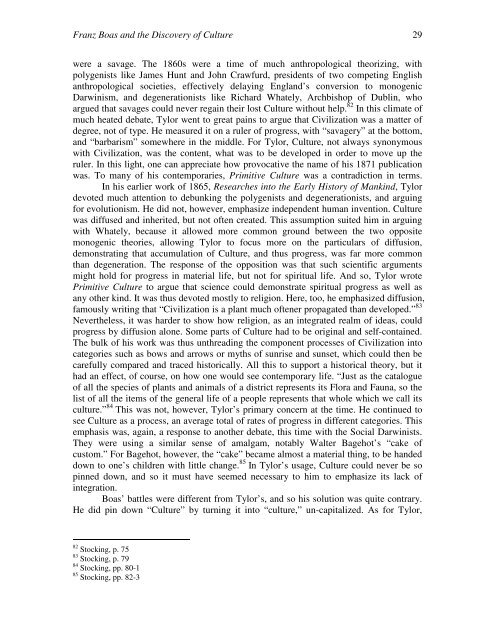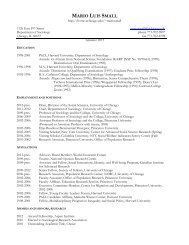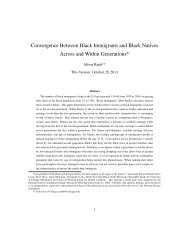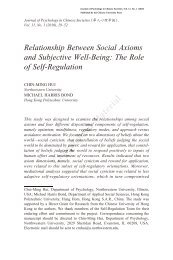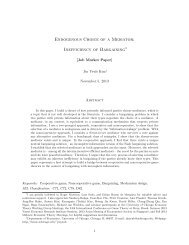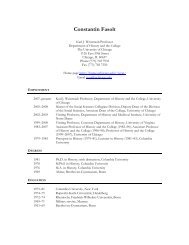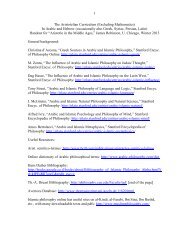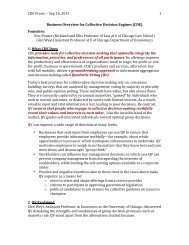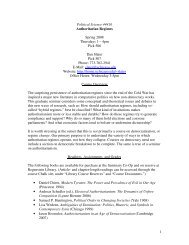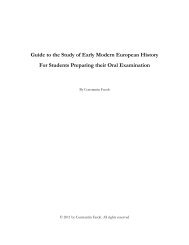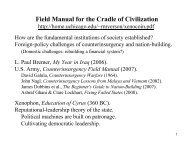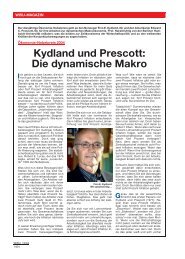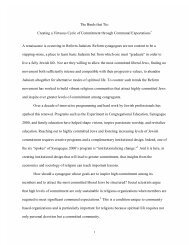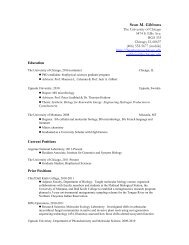Franz Boas and the Discovery of Culture - Personal Web Pages ...
Franz Boas and the Discovery of Culture - Personal Web Pages ...
Franz Boas and the Discovery of Culture - Personal Web Pages ...
Create successful ePaper yourself
Turn your PDF publications into a flip-book with our unique Google optimized e-Paper software.
<strong>Franz</strong> <strong>Boas</strong> <strong>and</strong> <strong>the</strong> <strong>Discovery</strong> <strong>of</strong> <strong>Culture</strong> 29<br />
were a savage. The 1860s were a time <strong>of</strong> much anthropological <strong>the</strong>orizing, with<br />
polygenists like James Hunt <strong>and</strong> John Crawfurd, presidents <strong>of</strong> two competing English<br />
anthropological societies, effectively delaying Engl<strong>and</strong>’s conversion to monogenic<br />
Darwinism, <strong>and</strong> degenerationists like Richard Whately, Archbishop <strong>of</strong> Dublin, who<br />
argued that savages could never regain <strong>the</strong>ir lost <strong>Culture</strong> without help. 82 In this climate <strong>of</strong><br />
much heated debate, Tylor went to great pains to argue that Civilization was a matter <strong>of</strong><br />
degree, not <strong>of</strong> type. He measured it on a ruler <strong>of</strong> progress, with “savagery” at <strong>the</strong> bottom,<br />
<strong>and</strong> “barbarism” somewhere in <strong>the</strong> middle. For Tylor, <strong>Culture</strong>, not always synonymous<br />
with Civilization, was <strong>the</strong> content, what was to be developed in order to move up <strong>the</strong><br />
ruler. In this light, one can appreciate how provocative <strong>the</strong> name <strong>of</strong> his 1871 publication<br />
was. To many <strong>of</strong> his contemporaries, Primitive <strong>Culture</strong> was a contradiction in terms.<br />
In his earlier work <strong>of</strong> 1865, Researches into <strong>the</strong> Early History <strong>of</strong> Mankind, Tylor<br />
devoted much attention to debunking <strong>the</strong> polygenists <strong>and</strong> degenerationists, <strong>and</strong> arguing<br />
for evolutionism. He did not, however, emphasize independent human invention. <strong>Culture</strong><br />
was diffused <strong>and</strong> inherited, but not <strong>of</strong>ten created. This assumption suited him in arguing<br />
with Whately, because it allowed more common ground between <strong>the</strong> two opposite<br />
monogenic <strong>the</strong>ories, allowing Tylor to focus more on <strong>the</strong> particulars <strong>of</strong> diffusion,<br />
demonstrating that accumulation <strong>of</strong> <strong>Culture</strong>, <strong>and</strong> thus progress, was far more common<br />
than degeneration. The response <strong>of</strong> <strong>the</strong> opposition was that such scientific arguments<br />
might hold for progress in material life, but not for spiritual life. And so, Tylor wrote<br />
Primitive <strong>Culture</strong> to argue that science could demonstrate spiritual progress as well as<br />
any o<strong>the</strong>r kind. It was thus devoted mostly to religion. Here, too, he emphasized diffusion,<br />
famously writing that “Civilization is a plant much <strong>of</strong>tener propagated than developed.” 83<br />
Never<strong>the</strong>less, it was harder to show how religion, as an integrated realm <strong>of</strong> ideas, could<br />
progress by diffusion alone. Some parts <strong>of</strong> <strong>Culture</strong> had to be original <strong>and</strong> self-contained.<br />
The bulk <strong>of</strong> his work was thus unthreading <strong>the</strong> component processes <strong>of</strong> Civilization into<br />
categories such as bows <strong>and</strong> arrows or myths <strong>of</strong> sunrise <strong>and</strong> sunset, which could <strong>the</strong>n be<br />
carefully compared <strong>and</strong> traced historically. All this to support a historical <strong>the</strong>ory, but it<br />
had an effect, <strong>of</strong> course, on how one would see contemporary life. “Just as <strong>the</strong> catalogue<br />
<strong>of</strong> all <strong>the</strong> species <strong>of</strong> plants <strong>and</strong> animals <strong>of</strong> a district represents its Flora <strong>and</strong> Fauna, so <strong>the</strong><br />
list <strong>of</strong> all <strong>the</strong> items <strong>of</strong> <strong>the</strong> general life <strong>of</strong> a people represents that whole which we call its<br />
culture.” 84 This was not, however, Tylor’s primary concern at <strong>the</strong> time. He continued to<br />
see <strong>Culture</strong> as a process, an average total <strong>of</strong> rates <strong>of</strong> progress in different categories. This<br />
emphasis was, again, a response to ano<strong>the</strong>r debate, this time with <strong>the</strong> Social Darwinists.<br />
They were using a similar sense <strong>of</strong> amalgam, notably Walter Bagehot’s “cake <strong>of</strong><br />
custom.” For Bagehot, however, <strong>the</strong> “cake” became almost a material thing, to be h<strong>and</strong>ed<br />
down to one’s children with little change. 85 In Tylor’s usage, <strong>Culture</strong> could never be so<br />
pinned down, <strong>and</strong> so it must have seemed necessary to him to emphasize its lack <strong>of</strong><br />
integration.<br />
<strong>Boas</strong>’ battles were different from Tylor’s, <strong>and</strong> so his solution was quite contrary.<br />
He did pin down “<strong>Culture</strong>” by turning it into “culture,” un-capitalized. As for Tylor,<br />
82 Stocking, p. 75<br />
83 Stocking, p. 79<br />
84 Stocking, pp. 80-1<br />
85 Stocking, pp. 82-3


